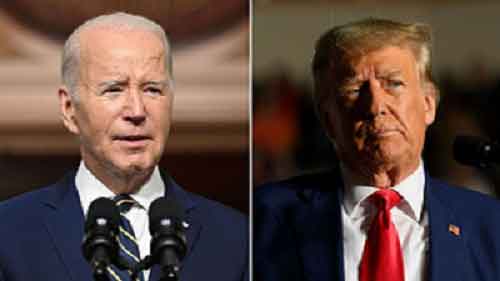
The discontent behind the Biden-Trump rematch
Recent polls have revealed a significant discontent among American voters regarding the potential rematch between Biden and Trump. According to a nationwide survey of 1,250 U.S. adults, Trump currently leads Biden by a margin of 40% to 34%, with a notable portion of respondents undecided or considering alternative options. This shift towards Trump underscores a growing dissatisfaction with the prospect of another election dominated by the same candidates.
The sentiment of dissatisfaction is palpable, with 67% of respondents expressing fatigue with the recurring candidates in presidential elections. This widespread feeling reflects a broader discontent with the current political landscape, where polarizing figures often overshadow alternative voices. As Kimberly Sofge aptly
put it, “I honestly feel that we can
do better.”
In response to this dissatisfaction, alternative candidates have emerged, each posing a unique challenge to the Biden-Trump rematch. The No Labels Party, for instance, offers a potential candidate who could disrupt the traditional two-party system. However, despite significant funding, ballot access remains a formidable obstacle, highlighting the entrenched barriers facing third-party contenders.
Additionally, figures like Robert F. Kennedy Jr. present another alternative for disenchanted voters. His anti-establishment stance resonates with those seeking a departure from politics as usual. Yet, his candidacy also faces challenges, particularly in garnering widespread support and navigating the complexities of the electoral process.
Amidst this landscape of discontent, the candidacy of Literally Anybody Else stands out as a symbol of frustration with the status quo. While unconventional, his campaign reflects a broader desire for change and a rejection of the binary choice between Biden and Trump. However, securing ballot access and gaining traction among voters remain significant hurdles for his candidacy.
As we approach the upcoming election, it’s crucial to acknowledge the depth of dissatisfaction among American voters. The prospect of another Biden-Trump rematch has galvanized support for alternative candidates and fueled a broader conversation about the need for political reform. How these alternative candidates may affect the Biden and Trump candidacies remains to be seen. A strong showing by a third-party candidate could potentially alter the dynamics of the race by siphoning votes from both major parties. Additionally, the presence of alternative voices on the ballot may prompt voters to reconsider their allegiance to the established political order.
In this moment of discontent, it’s essential to consider the potential implications of alternative candidates on the electoral process. While challenges lie ahead, the desire for change and a more inclusive political landscape is evident. The path forward may be fraught with obstacles, but the possibility of a brighter future remains within reach.